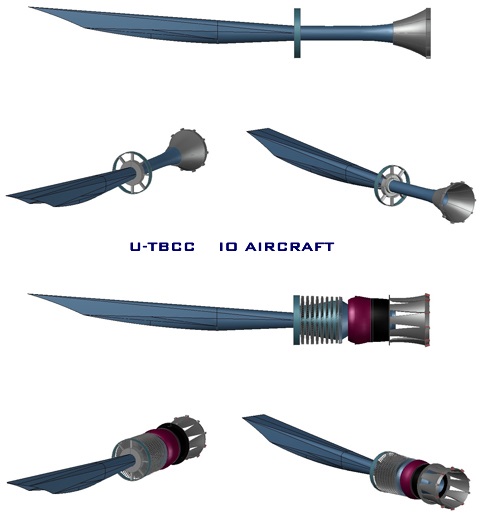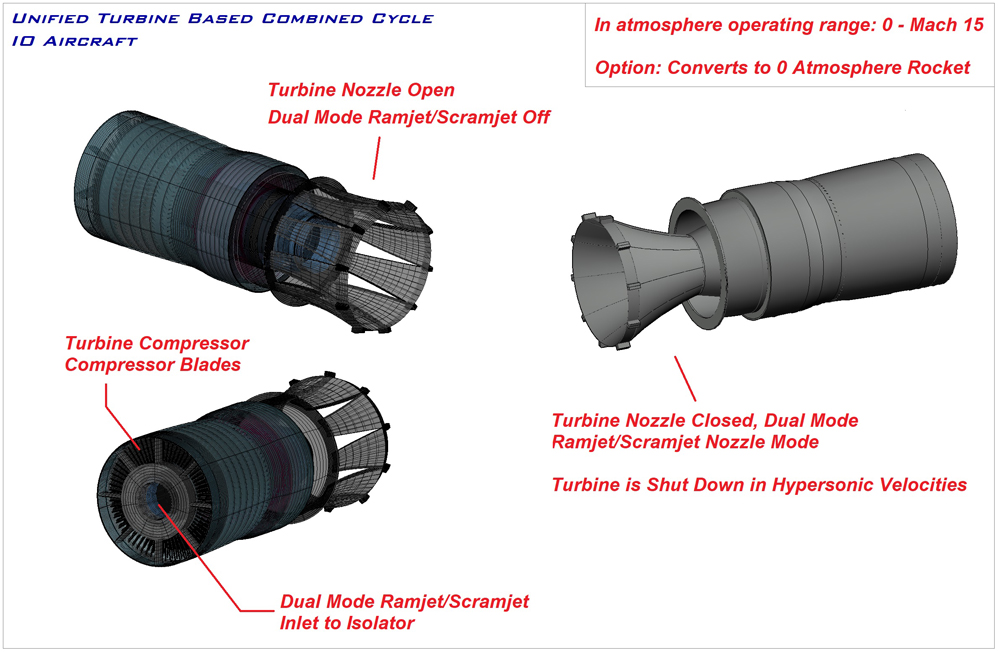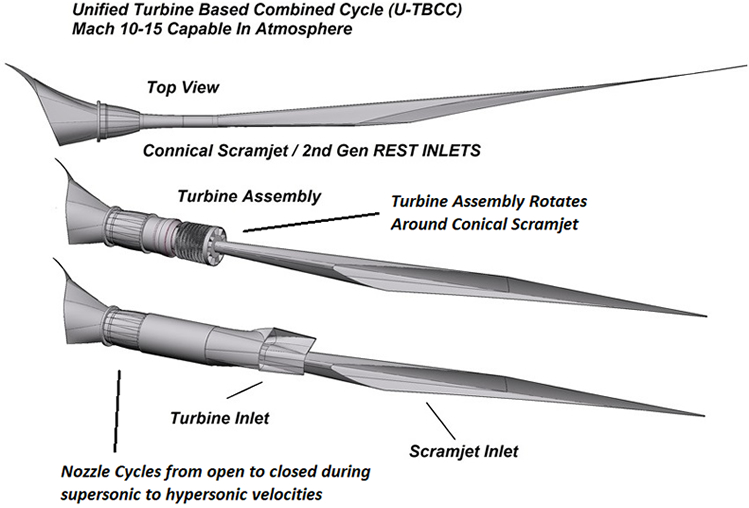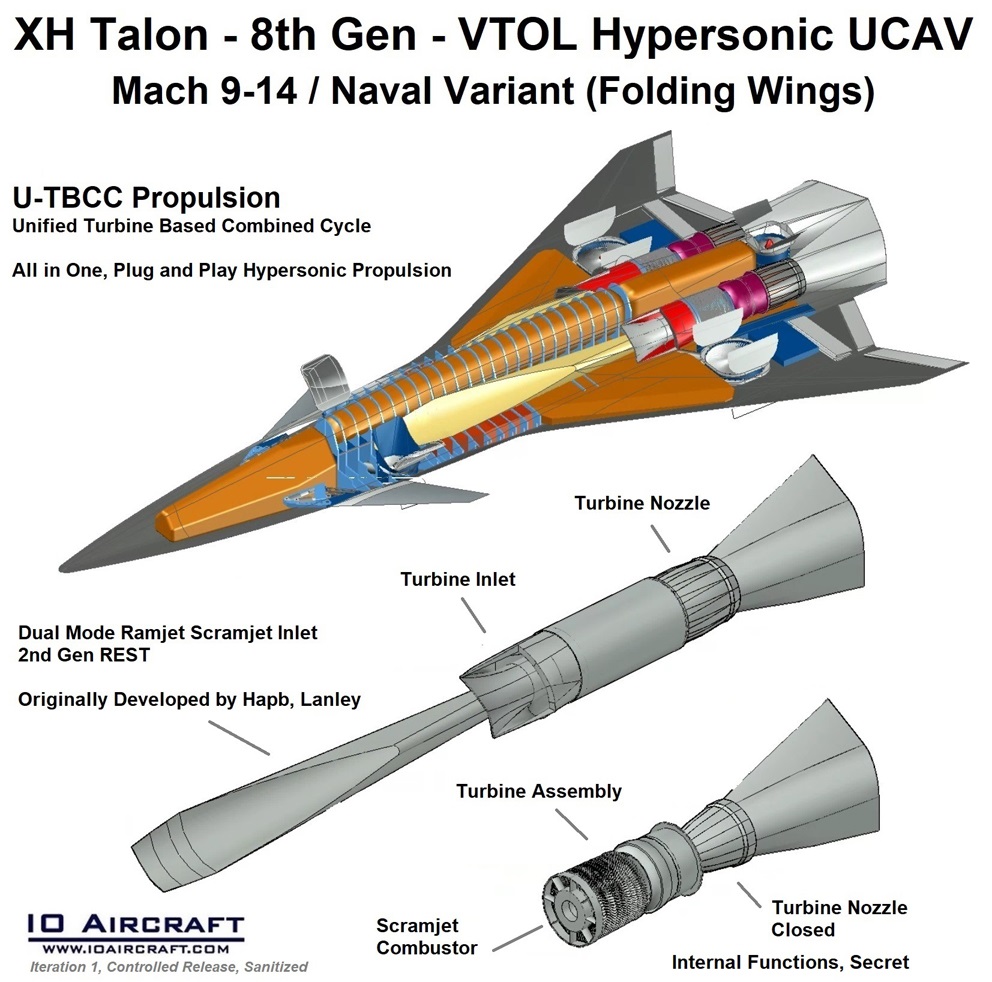|
Graphene |
Hypersonics |
U-TBCC |
U-GTG |
Motors & Rotors |
Conforming Tanks |
Primary ION Drives (Space)
IO Aircraft Technologies
U-TBCC (Unified Turbine Based Combined Cycle)
High Super Sonic - Hypersonics - SSTO
|
Propulsion Type |
Propriety
Turbine and Dual Mode Ramjet/Scramjet |
 |
|
Fuel |
Hydrogen (Hydro Carbon Free)
Plus Oxygen for outside atmosphere |
|
Operation Range |
0 - Mach 15 in Atmosphere |
|
|
|
|
|
|
|
|
|
|
|
|
Unified Turbine Based Combine Cycle is a propulsion that mates a turbine
(jet engine) and a dual mode ramjet/scramjet into a single propulsion platform.
Not like conventional TBCC today which are 2 separate platforms mounted
separately
and use a common inlet, which is what corporate entities like Lockheed are
developing or RBCC that China is developing.
Instead, it becomes a singular unit, all in one.
U-TBCC uses a modified REST inlet developed by Nasa's HAPB at
Langley, which is controlled using
an active dynamic shock system, which then transitions into a conical scramjet.
The turbine spins around the dual mode ramjet/scramjet.
Unlike other platforms, such as Reaction Engines Sabre which is limited to Mach
4.5 and is a bypass ramjet, the U-TBCC platform is engineered for 0 through Mach
15 velocities in atmosphere (normalized cruise capabilities at Mach 8-10 safely), and can transition internally to outside atmosphere
propulsion, ie rocket mode. In general, Reaction Engines Sabre, is only able to
operate at around one half the velocity as U-TBCC is capable of in atmosphere.
This propulsion platform is highly scalable, from smaller
long range hypersonic missile platforms, through large fixed wing aircraft able
to fly at hypersonic velocities and emerging technologies for single stage to
orbit capabilities.
Since it is meant to become plug and play, and takes up much
less airframe space, it become ideal as a standardized propulsion system
throughout the aerospace and space sectors.
Individual Technologies Involved with U-TBCC
-
Active adaptive dual mode ramjet/scramjet ignition
-
Active inlet, shock redirection (Variable Geometry,
in Flight)
-
Lower velocity ignition in ramjet mode with seamless
transition to scramjet mode
-
Adaptive isolator and combustion geometry
-
Ability to convert internally to outside atmosphere
rocket propulsion
-
Internal starter mechanics (no longer externally
mounted)
-
Free floating frictionless turbine assembly
-
Thermal management to beyond 5,000-6,000F
*Note, all technologies internally,
engineering, and physics involved with U-TBCC are proprietary and non
disclosable.



|

|
|
Hypersonic Plane, Hypersonic Aircraft, Hypersonic Jet, IO Aircraft, scramjet, ramjet, turbine based combined cycle, glide breaker, hypersonic, hypersonic weapon, hypersonic missile, Air Launched Rapid Response Weapon, ARRW, scramjet missile, boost glide, tactical glide vehicle, phantom works, skunk works, htv, hypersonic tactical vehicle, afrl, onr, boeing, utc, utx, ge, TBCC, RBCC, Reaction Engines, plane, turbine, spacex, virgin orbit, virgin galactic, usaf, single stage to orbit, sto, space plane, falcon heavy, delta iv, hypersonic commercial aircraft, hypersonic commercial plane, hypersonic aircraft, hypersonic plane, ICAO, boeing phantom express, phantom works, boeing phantom works, lockheed skunk works, hypersonic weapon, hypersonic missile, scramjet engineering, scramjet physics, scramjet, ramjet, dual mode ramjet, darpa, onr, navair, afrl, aerion supersonic, aerion, spike aerospace, boom supersonic, air taxi, vtol, personal air vehicle, vertical take off and landing, urban air mobility, ultralight, far 103, experimental, type certified, dual mode ramjet, scramjet engineering, scramjet physics, hypersonic weapons, hypersonic missiles, boost glide, tactical glide vehicle, phantom express, xs-1, htv, Air-Launched Rapid Response Weapon, ARRW, hypersonic tactical vehicle
|

